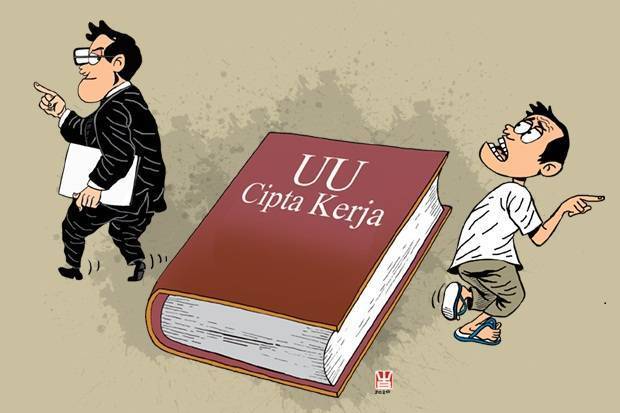The Job Creation Law Brings Indonesia to Become a Developed Country
The Job Creation Law Bring Indonesia to Become a Developed Country
By: Alfisyah Kumalasari) *
The Job Creation Law is a breakthrough by the Government in the field of regulation. Apart from being able to cut regulations and encourage investment, the implementation of the Job Creation Law is believed to be able to bring Indonesia out of the trap of a middle-class country.
The Job Creation Act (UU) does reap many pros and cons, but as a democracy, of course this is natural. However, Zamroni Salim as a researcher from the Center for Economic Research of the Indonesian Institute of Sciences (LIPI) considers that the Job Creation Law is the spearhead that needs to be used optimally so that Indonesia can escape the trap of being a middle-income country. This statement was made during a webinar on investment and trade in Jakarta.
Zamroni is of the opinion, the importance of the Job Creation Law because it can cut various permits contained in various laws and regulations so that it will advance national economic activities.
This is compounded by the fact that currently in various regions, including special trade areas, it is considered that many processes are still running in place, so that there are some homeworks to be done.
One example is in the food sector such as horticulture, where there must be an integrated responsibility to encourage local industries that are able to process food products into added value creation products.
On another occasion, Syahrudin Said as a researcher from Biotechnology LIPI said that the total population of Indonesia is around 271 million people in 2020, so the important issue is the provision of food and health, especially access to food is one of the aspects of human rights (HAM).
On the previous occasion, Minister of Research and Technology (Menristek) Bambang PS Brodjonegoro said that the development of a culture of innovation is the key for the country to be advanced and this must continue to be done by Indonesia in order to get out of the middle class income trap.
Bambang said that currently Indonesia still relies on natural resources as the backbone of the economy so that Indonesia still cannot escape the trap of a middle-income country.
Based on the experiences of several countries that have escaped the middle income trap, such as South Korea, the development of a culture of innovation is the key for a country to improve its economy to become a developed country.
On a different occasion, Mardani H Maming as Chairman of the Central Executive Board (BPP) of the Indonesian Young Entrepreneurs Association (HIPMI), said that the Omnibus Law of the Job Creation Law is a commitment and government policy in bringing Indonesia out of the trap of a middle-income country.
The Job Creation Law provides support for advancing micro, small and medium enterprises (MSMEs) in Indonesia in terms of ease of licensing, protection of MSMEs, ease of obtaining financing facilities, ability to absorb labor, providing protection against competition with large businesses and credit guarantees.
In his written statement in Jakarta, Maming did not deny that the Covid-19 pandemic had a serious impact on significant economic sectors, both in Indonesia and in the world in general.
Maming also invited all parties to continue to strengthen solidity and the ability to work together for the sake of the national interest.
Apart from having an impact on the health sector, other serious impacts also have an impact on employment and livelihoods, especially for the most vulnerable groups in society, including business actors who are also affected.
We also cannot deny that in 2035, Indonesia will head to the peak of the demographic bonus. Where in that year, 70 percent of Indonesia’s population were young people of productive age who were expected to be able to improve the nation’s economy.
The assumption that the Job Creation Law was able to lift Indonesia out of the trap of a middle-class country was also expressed by the Minister of Finance (Menkeu) Sri Mulyani. He said the law provides simple and efficient regulations.
He mentioned that there are provisions written in the Job Copyright Law. Namely dividends and after-tax income invested at least 30 percent of the profit after tax.
He also mentioned several rules written in the Omnibus Law in Law Number 2 of 2020 regarding the handling of the financial system impacted by Covid-19.
One of them is related to corporate income tax (PPh) which is lowered to 22 percent and 25 percent from 2020-2021.
The trap of the middle trap or middle country is certainly a challenge for Indonesia to be able to escape from this trap, of course the Job Creation Law is a formula that needs to be optimized so that the Indonesian economy can progress and develop.
) * The author is a contributor to the Cikini Press Circle and Students
